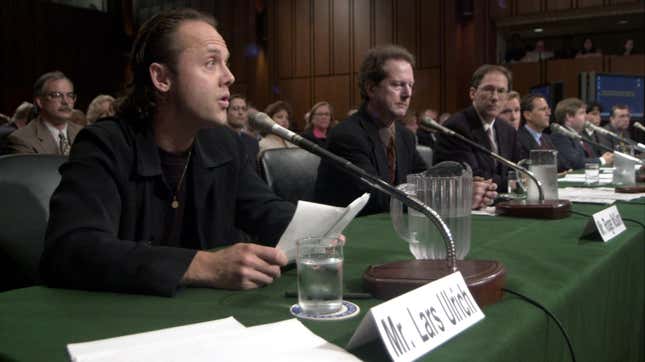The introduction and eventual acceptance of MP3s paved the way for possibly the most significant and controversial ‘90s music innovations: Napster and peer-to-peer file sharing.
Over the course of fewer than three years, Napster would rise and fall, acquire millions of curious users, and upend ideas around music ownership and distribution for decades to come. Napter’s founder, a college student named Shawn Fanning, reportedly articulated his idea for the service on an internet message board in 1999. Referred to by many as a “glorified file browser.”
Napster worked by letting users see MP3 files available on other computers and access them. By doing so other users, or peers could then access files on their computers in turn. The result was a dramatic and radical expansion of the amount of music potentially available to any one listener that hurled the industry out of the limited confines of CDs.
“There was no ramp-up. There was no transition,” Downloaded director Alex Winter said in a 2013 interview with The Guardian. “It was like that famous shot from 2001: A Space Odyssey when the prehistoric monkey throws a bone in the air and it turns into a spaceship. Napster was a ridiculous leap forward.”
Napster launched in May 1999 and reportedly had 4 million songs available in circulation by October of that same year. By March 2000, the site had amassed over 20 million users and by the summer, some 14,000 songs were reportedly being downloaded every minute.

Backlash from the record labels who felt like they were being denied compensation for songs they owned was strong and swift. Labels, led by the Record Industry Association of America, tried to bury Napster in a barrage of copyright lawsuits. Musicians, most notably Metallica and Dr. Dre. also launched their own heated, high-profile campaigns against the startup, but Napster wasn’t the only one feeling the heat. Individual Napster users, reportedly as many as 18,000 of them, were also sued, sometimes for simply accessing a handful of songs. The end came quickly for Napster. A court judge ruled in favor of RIAA and the site was given just 48 hours to start charging users for music.
Napster was acquired by a company called Roxio and then, in an odd string of events, eventually acquired by retailer Best Buy before being relaunched in 2016 in a short-lived effort to revive the band. Needless to say, that didn’t quite work out. Still, Napster’s legacy lives on in modern streaming services that cut deals with the record industry that realized it couldn’t compete with the bargain basement price of free.
Services Marketplace – Listings, Bookings & Reviews